Understanding whether a roll off dumpster is the right choice for your project involves evaluating the scope and nature of your debris or waste needs. In this article, we’ll explore key considerations to help you make an informed decision.
How Do I Determine the Right Size Roll Off Dumpster for My Project?
Assessing the Scale of Your Project
Consider the volume of waste you anticipate. The size and scope of your project greatly influence the amount of debris generated.
A small domestic renovation might produce less waste compared to a large-scale construction project.
Estimating the waste accurately can help determine the appropriate dumpster size. For instance, a bathroom remodel may require a 10-yard dumpster, while major home renovations could necessitate a 30-yard dumpster. Being thorough in assessing the waste volume ensures you choose a dumpster that accommodates all your debris without overflow.
Misjudging the scale can lead to renting a dumpster that is too large or too small, affecting costs and efficiency. An oversized dumpster may inflate expenses unnecessarily. Conversely, an undersized option could cause project delays as you await additional dumpster services.
Understanding Common Dumpster Sizes
A look at standard roll off dumpster sizes and their capacity to assist in selecting the best fit for your needs. Typically, dumpsters range from 10 to 40 yards. Each size is designed to handle varying levels of waste depending on project needs.
A 10-yard dumpster is often ideal for small cleanouts or minor renovation projects. On the other hand, large construction projects usually require a 30 or 40-yard dumpster to manage large debris amounts. Knowing these sizes enables you to choose the most efficient option for your project.
The size of the dumpster directly influences the rental cost and logistics of waste disposal. Renting the correct size ensures you only pay for what you need. This consideration also aids in reducing potential overage fees associated with waste overflow.
Consulting with Dumpster Rental Services
Tips for working with dumpster rental providers to ensure you choose a size that’s cost-effective and sufficient. Consultation with professionals can clarify uncertainties about your project’s waste needs. With their expertise, you can better estimate the right dumpster size.
Reputable dumpster rental services offer guidance based on project details, helping avoid unnecessary costs. They can also inform you about local regulations that might affect size and placement. By leveraging their knowledge, you ensure a more efficient and compliant waste management process.
Effective communication with rental services allows for scheduling flexibility and service reliability. By conveying your project’s timeline and requirements clearly, you select a provider that best matches your expectations. This proactive approach ensures a smooth process, avoiding unwanted surprises.
What Are the Costs Associated with Renting a Roll Off Dumpster?
Factors Influencing Rental Prices
Explore the different elements that contribute to the cost of dumpster rental, including location, size, and duration. Prices can vary significantly depending on regional fees in your area. Moreover, longer rental duration and larger sizes naturally increase expenses.
Factors like distance from the disposal site and local landfill fees also play crucial roles in determining cost. Urban areas may incur higher fees due to increased logistical challenges. Additionally, the seasonality of projects can influence demand and pricing.
Understanding these factors allows project managers to anticipate and budget for rental costs accurately. By factoring in all potential expenses, you avoid unexpected budget overruns. This strategic planning leads to more effective financial management for your project.
Understanding Additional Fees and Charges
Examine potential extra charges like permits, overage fees, and recycling costs that may impact your budget. These supplementary costs can arise from municipal regulations or specific disposal needs. For instance, permits may be required if the dumpster is placed on public property.
Overfilling a dumpster can lead to overage fees, emphasizing the importance of choosing the right size. Moreover, recycling certain materials might incur additional processing fees. Knowing these details upfront allows for better preparation and cost allocation.
Transparency regarding all potential charges is key when liaising with service providers. Ensure all terms and conditions are thoroughly vetted before committing to a service agreement. This precaution guards against unexpected financial burdens midway through your project.
Choosing a roll off dumpster involves various factors from size to cost. With insights into your project’s requirements and a clear understanding of rental options, you can make a decision that best fits your project needs. By aligning your strategy with efficient waste management practices, you ensure optimal resource allocation and project success.
.



